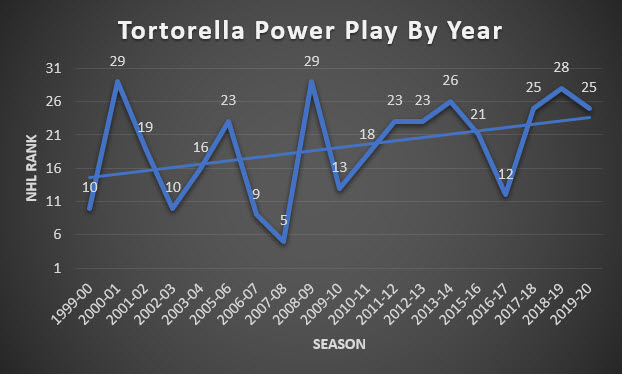In case you hadn't heard, the Blue Jackets power play is still bad.
Though it has shown signs of life with Emil Bemstrom goals in the past two games, the club ranks 25th in the NHL on power-play percentage, scoring on just 14.3% (8/56) of their chances. And while much of the blame seems to fall to Assistant Coach Brad Larsen, who runs the team's power play, perhaps more of the culpability should lie with their Head Coach, John Tortorella.
Even he would tell you so.
From The Athletic:
Tortorella made it clear that while Larsen coaches the power play, he’s not the singular voice in charge of the unit. He does the prep work in advance of games, but the coaching of the unit, the personnel changes, etc., are very much collaborative.
“Everybody is involved,” Tortorella said. “I am involved. If you’re going to be mad about the power play, it falls with me. I am the head coach of the hockey team. I’m involved with (Larsen) and making decisions with him. It falls to me; not him.
If you insist, Coach. But I'm not sure you'll like what the publicly available records show.
Tortorella has been a head coach in the NHL since 1999-00 when he took over the New York Rangers for the last four games of the regular season. That team had the 10th-ranked power play in the (then) 28-team NHL. Since then, Tortorella has led two teams (!) with a power-play eclipsing that rank: the 2006-07 and 2007-08 Tampa Bay Lightning, who finished ninth and fifth, respectively.
But aside from those two years, Tortorella has primarily coached power plays that rank in the bottom third of the league. His tenure with the Blue Jackets has been no different. In his five seasons, his club's power play has been ranked 21st, 12th (hello, Sam Gagner), 25th, 28th, and 25th.

I'll grant you that correlation does not imply causation, though the sample size seems large enough to at least warrant a discussion. And without being apart of power-play practices/film sessions/pre-scouting meetings/etc., it's impossible to say who is truly responsible for the club's inability to generate high-quality chances, much less goals, on the power-play.
According to NaturalStatTrick, the Blue Jackets generate the second-fewest scoring chances per 60 minutes (38.22), trailing only the lowly Detroit Red Wings (37.42). For reference, the Edmonton Oilers rank first with 71.24 scoring chances per 60 minutes. And while I am not privy to how NaturalStatTrick defines a "scoring chance", it's not as though the data is at odds with the result. Other metrics, like shot attempts/60, offer less grey area. Here, the Blue Jackets find themselves third-worst in the league, behind Detroit and the Arizona Coyotes. It doesn't take a genius to recognize that the Blue Jackets power play is often stagnant at best, harmful at worst.
While, at least to some extent, the blame should fall on the coaching staff, the players are certainly not exempt from the power-play failings. Success breeds confidence and confidence breeds success, and the Blue Jackets players have neither - and haven't for quite some time. They've tried to make some adjustments - new personnel in new spots - but one gets the sense that the issues run deeper than personnel. After all, this team has had a brutal power play with and without Artemi Panarin, one of the most dynamic players in the NHL.
When the club brought Martin St. Louis in as a power-play consultant late last season, it was celebrated as a new voice with obvious credentials and an ability to relate to the players. But it should also be a red flag that the current coaching staff is unable to bring this power play to legitimacy.
While Tortorella has his faults, he isn't responsible for the lack of scoring punch on this roster. So far, he’s getting out of his team about what you’d expect from this roster. The head coach has brought plenty of good to this franchise in his five-year tenure. But looking at history, it's obvious that a leopard won't change its spots. So long as Tortorella is at the helm, it's likely that the Blue Jackets will have a below-average power-play. And at this point, that's less opinion and more public knowledge.
